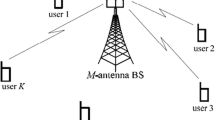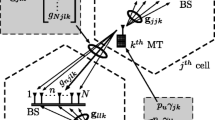Abstract
This research examines the performing of linear precoding techniques in downlink massive MIMO systems. The downlink massive MIMO systems, linear precoding techniques as combined to zero forcing (ZF) and matched filter (MF), truncated polynomial expansion (TPE) and regularized zero forcing (RZF). The output of massive MIMO downlinks is analyzed with linear precoding. The performing of sum rate precoding of signal-to-noise (SNR) ratio, as well as numerous transmitter-receiver antennas, is discussed, including defective CSI and inter-user interference. On the channel, the transmitter as entire state information. The data describes how a signal travels from the transmitter to the receiver, taking into account factors like as space scattering and power decay. They appearance that given a perfect chain, the performing analyzed of two linear precoding approaches, namely Zero Forcing (ZF) and Matched filter (MF) for downlink mMIMO. The results demonstrate ZF, higher BER and sum rate as comparing to MF schemes, as well as a comparison of RZF and TPE average achievable rates. In multi-user scenarios, Kalman-based hybrid precoding (analog/digital) as used in a downlink throughput of 5.14 Gbps and a uplink rate of 2.26 Gbps. The impact of beam steering capability on both base stations (BS) and 5G user equipment (UEs) is also investigated. Based on the simulation results, the suggested approach provides a significant increase in spectral efficiency of 10.53 bps/Hz with 10 channel routes.









Similar content being viewed by others
Data Availability
Data sharing not applicable to this article as no datasets were generated during the current study.
Code Availability
Software Application.
References
Abrahim, A. M., & Abdelwahab, M. M. (2017). Sum rate analysis of massive multiple input multiple output system for linear precoding using normalization methods. In International conference on communication, control, computing and electronics engineering (ICCCCEE) (pp. 1–7). IEEE. Khartoum, Sudan.
Guey, J. C., Liao, P. K., Chen, Y. S., Hsu, A., Hwang, C. H., & Lin, G. (2015). On 5G radio access architecture and technology [Industry Perspectives]. IEEE Wireless Communications, 22(5), 2–5.
Subuh Pramono, E. T. (2018). Comparative performance analysis of linear precoding in downlink multi-user mimo. EECSI,Malang - Indonesia., 16–18 .
Ngo, H. Q. (2015). Massive mimo: Fundamentals and system designs," Linköping university.
Fatema, N., Hua, G., Xiang, Y., Peng, D., & Natgunanathan, I. (2017). Massive MIMO linear precoding: A survey. IEEE systems journal, 12(4), 3920–3931.
Hoydis, J., Ten Brink, S., & Debbah, M. (2013). Massive MIMO in the UL/DL of cellular networks: How many antennas do we need?. IEEE Journal on selected Areas in Communications, 31(2), 160–171.
Ho, C. D., Ngo, H. Q., Matthaiou, M., & Duong, T. Q. (2017). On the performance of zero-forcing processing in multi-way massive MIMO relay networks. IEEE Communications Letters, 21(4), 849–852.
Parfait, T., K, Y., & Jerry, K. (2014). Performance analysis and comparison of zf and mrt based downlink massive mimo systems. In 6th International Conference on Ubiquitous and Future Networks, 383–388.
Muller, A., Couillet, R., Bjornson, E., Wagner, S., & Debbah, M. (2015). Interference-aware RZF precoding for multicell downlink systems. IEEE Transactions on Signal Processing, 63(15), 3959–3973.
Mueller, A., Kammoun, A., Bjornson, E., & Debbah, M. (2016). Linear precoding based on polynomial expansion: Reducing complexity in massive mimo. EURASIP Journal on Wireless Communications and Networking. https://doi.org/10.1186/s13638-016-0546-z.
Mehana, A. H., & Nosratinia, A. (2013). Diversity of mimo linear precoding. IEEE Transactions on Signal Processing, 2, 1019–1038.
Zarei, S., Gerstacker, W., Müller, R. R., & Schober, R. (2013, September). Low-complexity linear precoding for downlink large-scale MIMO systems. IEEE PIMRC.
Wagner, S., Couillet, R., Debbah, M., & Slock, D. T. M. (2009). Large system analysis of linear precoding in MISO broadcast channels with limited feedback. IEEE Transactions on Information Theory, volume 58, 4509–4537.
Lim, Y. G., Chae, C. B., & Caire, G. (2015). Performance analysis of massive MIMO for cell-boundary users. IEEE Transactions on Wireless Communications, 14(12), 6827–6842.
Heath, R. W., Gonzalez-Prelcic, N., Rangan, S., Roh, W., & Sayeed, A. M. (2016). An overview of signal processing techniques for millimeter wave MIMO systems. IEEE journal of selected topics in signal processing, 10(3), 436–453.
El Ayach, O., Rajagopal, S., Abu-Surra, S., Pi, Z., & Heath, R. W. (2014). Spatially sparse precoding in millimeter wave MIMO systems. IEEE transactions on wireless communications, 13(3), 1499–1513.
Nguyen, D. H., Le, L. B., Le-Ngoc, T., & Heath, R. W. (2017). Hybrid MMSE precoding and combining designs for mmWave multiuser systems. IEEE Access, 5, 19167–19181.
Han, S., Chih-Lin, I., Xu, Z., & Rowell, C. (2015). Large-scale antenna systems with hybrid analog and digital beamforming for millimeter wave 5G. IEEE Communications Magazine, 53(1), 186–194.
Kim, C., Kim, T., & Seol, J. Y. (2013, December). Multi-beam transmission diversity with hybrid beamforming for MIMO-OFDM systems. In 2013 IEEE Globecom Workshops (GC Wkshps) (pp. 61-65). IEEE.
Zhang, X., Molisch, A. F., & Kung, S. Y. (2005). Variable-phase-shift-based RF-baseband codesign for MIMO antenna selection. IEEE Transactions on Signal Processing, 53(11), 4091–4103.
Venkateswaran, V., & van der Veen, A. J. (2010). Analog beamforming in MIMO communications with phase shift networks and online channel estimation. IEEE Transactions on Signal Processing, 58(8), 4131–4143.
Zhao, L., Ng, D. W. K., & Yuan, J. (2017). Multi-user precoding and channel estimation for hybrid millimeter wave systems. IEEE Journal on Selected Areas in Communications, 35, 1576–1590.
Nguyen, D. H., Le, L. B., & Le-Ngoc, T. (2016, May). Hybrid MMSE precoding for mmWave multiuser MIMO systems. In 2016 IEEE international conference on communications (ICC) (pp. 1–6). IEEE.
Alkhateeb, A., El Ayach, O., Leus, G., & Heath, R. W. (2014). Channel estimation and hybrid precoding for millimeter wave cellular systems. IEEE journal of selected topics in signal processing, 8(5), 831–846.
Xia, P., Yong, S. K., Oh, J., & Ngo, C. (2008). A practical SDMA protocol for 60 GHz millimeter wave communications. In 42nd Asilomar Conference on Signals, Systems and Computers (pp. 2019-2023). IEEE.
Alkhateeb, A., Leus, G., & Heath, R. W. (2015). Limited feedback hybrid precoding for multi-user millimeter wave systems. IEEE transactions on wireless communications, 14(11), 6481–6494.
Ni, W., & Dong, X. (2015). Hybrid block diagonalization for massive multiuser MIMO systems. IEEE transactions on communications, 64(1), 201–211.
Funding
The authors received no financial support for the research work.
Author information
Authors and Affiliations
Corresponding author
Ethics declarations
Conflict of interest
The authors declare that they have no conflict of interest.
Additional information
Publisher's Note
Springer Nature remains neutral with regard to jurisdictional claims in published maps and institutional affiliations.
Rights and permissions
About this article
Cite this article
Thurpati, S., Muthuchidamabaranathan, P. Performance Analysis of Linear and Hybrid Precoding on Massive MIMO System Using Truncated Polynomial Expansion. Wireless Pers Commun 126, 1129–1144 (2022). https://doi.org/10.1007/s11277-022-09785-w
Accepted:
Published:
Issue Date:
DOI: https://doi.org/10.1007/s11277-022-09785-w




